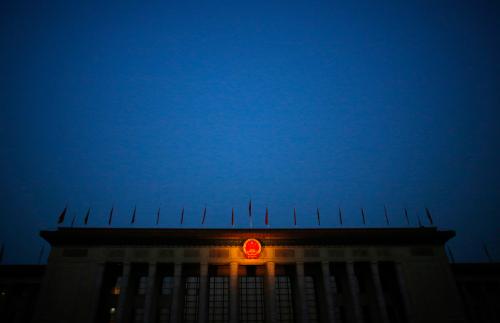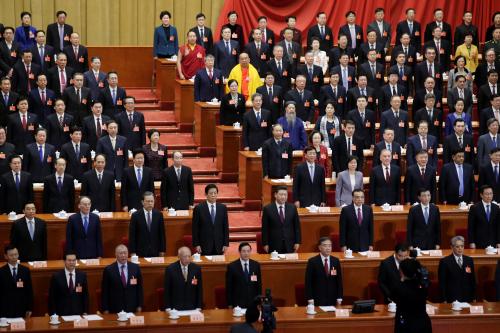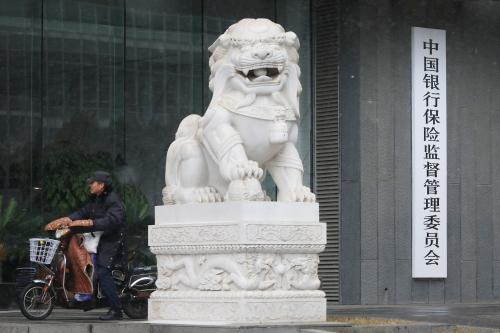“The unfolding long-term strategic competition with China is the defining challenge of our generation,” said Assistant Secretary of Defense for Indo-Pacific Security Affairs Randall Schriver at a Brookings event on October 1 as part of a broader initiative titled “Global China: Assessing China’s Growing Role in the World.”
In his keynote address, Assistant Secretary Schriver outlined the fundamental principles underpinning U.S. defense strategy toward China and perspectives on engaging with China in an “era of strategic competition.” He argued that current geopolitical realities require a “fundamental change in mindset” away from one of “American dominance” to one that “adapts to the increasingly sophisticated capabilities of its near-peer competitors.” During discussion with Brookings Fellow and Michael H. Armacost Chair Ryan Hass, Schriver described how the U.S.-China military-to-military relationship can be a “stabilizing force” and noted that high-level engagements and confidence-building exercises remain robust and largely insulated from the ups and downs in the U.S.-China relationship.
The panel discussion that followed — moderated by Brookings Fellow Tarun Chhabra — centered on the foreign policy implications of domestic developments in China and trends in “strategic domains” of U.S.-China competition. The panelists discussed continuity and change in domestic and foreign policy under the leadership of Chinese President Xi Jinping. Fellow and Director of Brookings’s China Strategy Initiative Rush Doshi contended that China’s grand strategy transcends regional interests, and that its efforts to cultivate influence and strategic advantages around the world point toward China’s global ambitions. These ambitions also precede, Doshi argued, Xi’s rise to power. China’s interests in shaping global governance, for example, was consistently mentioned in Chinese Communist Party documents before Xi Jinping assumed the presidency, even if certain aspects, such as the Belt and Road Initiative (BRI), were elevated and institutionalized under Xi.
Brookings Post-doctoral Research Fellow Audrye Wong provided context on how Chinese economic coercion plays out in different regions of the world through BRI, and suggested that U.S. national security strategy needs to better address China’s economic statecraft, including through better economic statecraft of its own. Doshi noted that, despite criticism of BRI approaches to development financing, corruption, and transparency, BRI has proven to be resilient. He called on the United States to more systematically raise awareness about BRI risks and partner with BRI recipient countries to negotiate better terms for BRI deals, while also doing more with allies to provide alternatives to BRI.
On domestic legal and political drivers of China’s foreign policy, Senior Fellow and Director of Brookings’s China Center Cheng Li emphasized that it is “very, very important for our policymakers to appreciate” the impact of Xi’s consolidation of authority as a “populist,” including anti-corruption initiatives and a focus on poverty elimination. Li suggested that the impacts of a reported “backlash” to Xi’s rule may therefore be overstated. Brookings Visiting Fellow Jamie Horsley added a legal dimension: Where Xi’s policy departs from his predecessors, she noted, is the codification of Communist Party authority into Chinese law, alongside an intensification of extra-legal measures against perceived enemies of the Party. Horsley warned this approach is likely to further undermine trust and confidence in Chinese state legal commitments both at home and abroad.






Commentary
Highlights: Experts discuss the domestic drivers and strategic implications of an increasingly global China
October 16, 2019